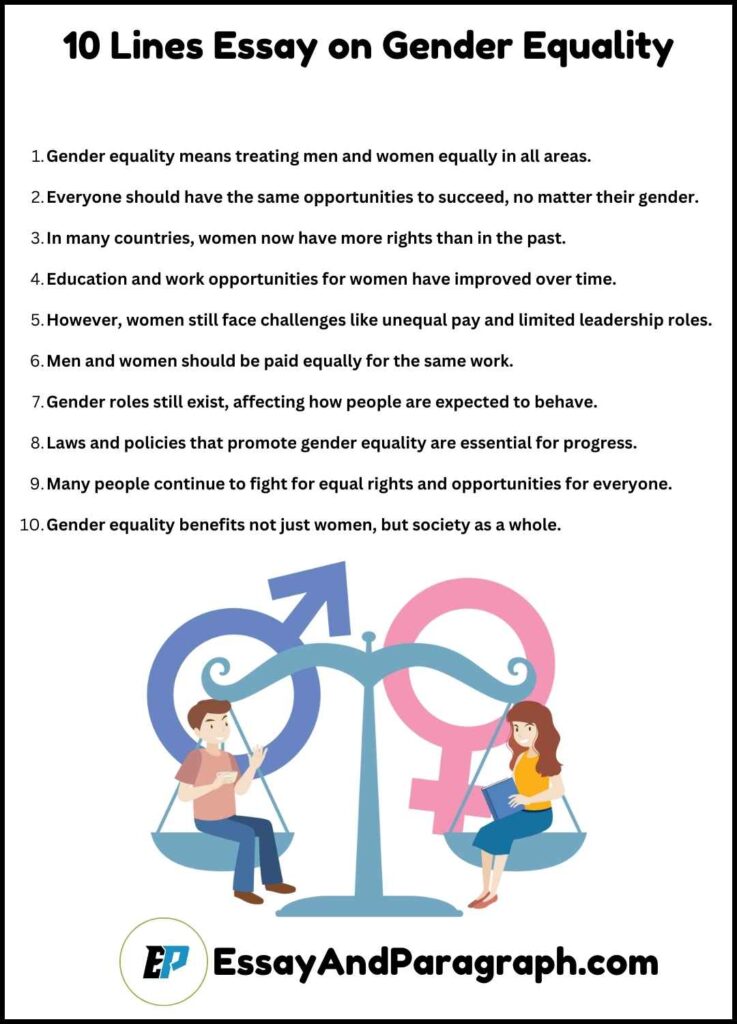Have you ever wondered what it means to live in a world where everyone, regardless of gender, has the same opportunities? Gender equality is the idea that men and women should have equal rights, opportunities, and respect in all aspects of life. While significant progress has been made in many parts of the world, challenges still remain. In this article, we will learn how to write an essay on gender equality and explore the progress made, as well as the hurdles that still need to be overcome.
10 Lines Essay on Gender Equality
- Gender equality means treating men and women equally in all areas.
- Everyone should have the same opportunities to succeed, no matter their gender.
- In many countries, women now have more rights than in the past.
- Education and work opportunities for women have improved over time.
- However, women still face challenges like unequal pay and limited leadership roles.
- Men and women should be paid equally for the same work.
- Gender roles still exist, affecting how people are expected to behave.
- Laws and policies that promote gender equality are essential for progress.
- Many people continue to fight for equal rights and opportunities for everyone.
- Gender equality benefits not just women, but society as a whole.

Short Essay on Gender Equality: Progress and Challenges
Gender equality means that men and women should have equal rights and opportunities in all areas of life. In recent years, there has been a lot of progress in the fight for gender equality. Women now have the right to vote, work, and get an education in many countries where they were once denied these basic rights. This is a huge achievement, and it has changed the lives of millions of women worldwide.
However, despite these advancements, challenges still exist. Women often earn less money than men for doing the same job, which is known as the gender pay gap. In many places, women are still underrepresented in leadership positions in politics, business, and other fields. Additionally, traditional gender roles continue to shape how men and women are expected to behave. For example, women are often expected to take care of the home and children, while men are expected to be the primary earners.
These inequalities are not just harmful to women; they affect society as a whole. When women are not given equal opportunities, society loses out on the skills, ideas, and talents that they could bring to the table. Promoting gender equality helps to create a more just and fair society where everyone, regardless of gender, can thrive.
To achieve full gender equality, it is important for laws and policies to be put in place that support equal rights. Governments, organizations, and individuals all have a role to play in ensuring that everyone is treated equally, no matter their gender.
Long Essay on Gender Equality: Progress and Challenges
Gender equality is a fundamental human right that advocates for equal opportunities and rights for men and women in all aspects of life. The journey toward gender equality has been long and filled with struggles, but there has been significant progress over the past century. While many barriers have been broken, challenges still persist, and the path to complete equality remains a work in progress.
One of the most significant milestones in the fight for gender equality has been the improvement in women’s rights. In the past, women were denied basic rights such as voting, education, and the ability to work outside the home. Today, women in many countries have the legal right to vote, receive an education, and pursue careers. These advancements have had a profound impact on the lives of women, empowering them to take control of their futures and contribute to society in meaningful ways.
Despite these achievements, gender equality is still far from a reality in many parts of the world. One of the main challenges that women continue to face is the gender pay gap. Research shows that women, on average, earn less than men for performing the same job. This pay disparity is influenced by several factors, including discrimination, the types of jobs women are encouraged to take, and the fact that women often take time off from work to raise children. Closing the gender pay gap is essential for ensuring that women are treated fairly and given the same opportunities as men.
In addition to unequal pay, women are also underrepresented in leadership roles. While there have been some notable female leaders in politics and business, such as Angela Merkel and Indra Nooyi, women still make up a small percentage of top executives, government officials, and lawmakers. This lack of representation in leadership positions is not only a sign of inequality but also limits the perspectives and experiences that are brought to decision-making tables. To create more inclusive and effective leadership, it is essential to have equal representation from both genders.
Another challenge is the persistence of traditional gender roles, which often place pressure on both men and women to conform to certain behaviors. Women are often expected to take on caregiving roles, such as raising children and maintaining the household, while men are expected to be the primary breadwinners. These traditional expectations can limit both men’s and women’s opportunities to pursue their passions and careers. In many cases, these roles are reinforced by societal norms and expectations, which can make it difficult for individuals to break free from them.
Despite these challenges, there is hope for the future. Many countries have passed laws that promote gender equality, such as equal pay legislation and policies supporting women in the workplace. In addition, there are numerous organizations and movements fighting for women’s rights, such as the #MeToo movement and various international groups advocating for women’s empowerment. These efforts have already made a significant impact, and with continued support, gender equality can become a reality for all.
In conclusion, gender equality is an ongoing struggle that requires the efforts of governments, organizations, and individuals to overcome. While significant progress has been made, there are still many barriers that need to be addressed. Achieving gender equality is not only important for the well-being of women but for the betterment of society as a whole. A world where men and women are treated equally will lead to stronger, fairer, and more prosperous communities.
FAQs on Essay on Gender Equality
1. What is gender equality?
Gender equality means that everyone, regardless of gender, should have the same rights, opportunities, and treatment. It involves ensuring that men and women have equal access to education, work, healthcare, and political participation. The goal is to create a world where both genders can fully participate in all aspects of life without facing discrimination.
2. What progress has been made in gender equality?
Over the years, there has been significant progress in gender equality. Women now have the right to vote, work, and receive an education in many parts of the world. There are also more laws in place that support equal rights, such as equal pay legislation and laws against gender-based violence. These changes have empowered women and opened up many new opportunities.
3. What are the main challenges to achieving gender equality?
Despite progress, there are still many challenges to achieving full gender equality. The gender pay gap is a major issue, as women often earn less than men for the same work. Additionally, women are still underrepresented in leadership roles, and traditional gender roles continue to limit the opportunities available to both men and women.
4. How can we promote gender equality?
Promoting gender equality requires changes at both the individual and societal levels. This can include supporting laws and policies that ensure equal rights for all, challenging traditional gender roles, and encouraging both men and women to pursue careers and interests without limitations. Education and awareness-raising efforts are also crucial in changing attitudes toward gender equality.
5. Why is gender equality important for society?
Gender equality benefits society as a whole. When men and women are treated equally, it leads to a more just and fair world. Gender equality also helps unlock the full potential of individuals, which leads to economic growth, better decision-making, and more effective leadership. Ultimately, a more equal society is a stronger society.
Top 5 Quotes on Essay on Gender Equality
- “Gender equality is more than a goal in itself. It is a precondition for meeting the challenge of reducing poverty, promoting sustainable development, and building good governance.” – Kofi Annan
- “Equality for women is progress for all.” – Ban Ki-moon
- “We cannot all succeed when half of us are held back.” – Malala Yousafzai
- “Gender equality is not a women’s issue, it’s a human issue. It affects us all.” – Unknown
- “A woman is like a tea bag – you never know how strong she is until you put her in hot water.” – Eleanor Roosevelt
Summary on Essay on Gender Equality
Gender equality is a crucial issue that affects everyone in society. While there has been significant progress, such as women gaining the right to vote and work, challenges like unequal pay, underrepresentation in leadership, and traditional gender roles remain. Gender equality is essential not only for the well-being of women but for society as a whole. When both men and women have equal opportunities, the entire community benefits. By continuing to fight for equal rights and breaking down societal barriers, we can create a more just, fair, and prosperous world.










